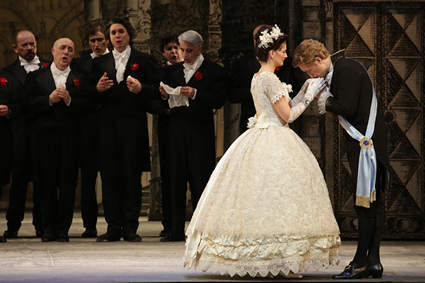| Opera Reviews | 2 May 2024 |
Ponnelle's Cenerentola at La Scala is still delightfulby Silvia Luraghi |
|
| Rossini: La Cenerentola Teatro alla Scala, Milan 23 February 2019 |
|

Marianne Crebassa (Angelina), Maxim Mironov (Don Ramiro), Chorus
|
|
|
The 1973 Jean-Pierre Ponnelle production of Gioachino Rossini’s La Cenerentola remains an evergreen at La Scala. Even though Rossini’s title, once a rarity, is now a comparatively frequent feature in opera seasons around the world, this production still captures the audience's attention and offers a refreshing and delightful evening of entertainment. The first act opens on the interior of Don Magnifico’s two-storey house, with Cenerentola cleaning the kitchen, with her two step sisters in their bedrooms hysterically calling for her assistance while dressing, and Don Magnifico sleeping in the upper floor. A huge door in the background of the ample ball room in Don Ramiro’s palace opens at the end of the second act to let Cenerentola, now in a luxurious ball dress, come in to the amazement of Don Magnifico and his daughters. The same set hosts the double disclosure of the real identity of the mysterious lady and of Don Ramiro, who had exchanged roles with his servant. This year’s revival, under the responsibility of Grischa Asagaroff, could count on a cast of singers that made a well-knit team and whose voices perfectly adapted to the score. Mezzo Marianne Crebassa was a meek, yet determined Angelina/Cenerentola, and mastered with apparent ease the demanding tessitura. Her agile, darkly colored voice remains homogeneous when she reaches the top notes, perfectly supported by her breath. Tenor Maxim Mironov is a rising star among Rossini singers: he was a very stylish Don Ramiro, trying to keep the appropriate distance from his servant Dandini while disguised. The latter was baritone Nicola Alaimo, vocally flawless and very compelling in the buffo role, as was bass-baritone Carlos Chausson, a delightful don Magnifico. Tsisana Giordgadze and Anna-Doris Capitelli, two young singers from the La Scala Academy, were also very compelling in the roles of the shrews Clorinda and Tisbe, Angelina’s step-sisters. Bass-baritone Erwin Schrott, with his handsome voice and imposing stage presence, portrayed an authoritative Alidoro. Conductor Ottavio Dantone conducted with great care the edition of the Fondazione Rossini. The revival is dedicated to Claudio Abbado, who conducted the original production in 1973marking the fifth anniversary of his death.
|
|
| Text ©
Silvia Luraghi Photo © Teatro alla Scala |
|







